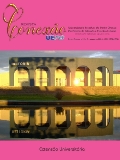CORAÇÕEZINHOS DE BAEPENDI NA EDUCAÇÃO EM SAÚDE ATRAVÉS DA METODOLOGIA PARTICIPATIVA: RELATO DE EXPERIÊNCIA - DOI: 10.5212/Rev.Conexao.v.12.i3.0003
DOI:
https://doi.org/10.5212/Rev.Conexao.v.12.i3.0003Palabras clave:
Metodologia participativa, Educação em saúde, Teatro de fantoches.Resumen
O presente artigo emergiu de ações do Projeto de Extensão “Coraçõezinhos de Baependi”, desenvolvido através de uma parceria entre a UFJF e o INCOR/HC-FMUSP, na cidade de Baependi (MG). O projeto baseiase na metodologia participativa na construção de um ensino integral, tendo como ferramentas o teatro de fantoches e a música, e objetiva a promoção da saúde das crianças envolvidas, esperando despertar nelas o interesse pela ciência e pesquisa, fomentando a busca pelo conhecimento e incentivo ao autocuidado. Ao final das oficinas realizadas, foi visível a evolução quanto à participação dos alunos, ao interesse e à compreensão dos temas, o que foi relatado tanto pelos docentes da escola, como pelos familiares. Concluise, assim, que a introdução ainda na infância de conhecimento em saúde mostrou-se eficaz na promoção de autocuidado e prevenção de morbidades, reforçando o propósito das escolas como terrenos férteis para a disseminação de conceitos em saúde.
Descargas
Citas
BANDEIRA, E. M. A música como instrumento facilitador da aprendizagem: uma aplicação prática no ensino fundamental da escola Benjamin Sodré. 2008. 55 f. Trabalho de Conclusão de Curso (Licenciatura Plena em Letras com Habilitação em Português e Inglês) – Faculdade Sete de Setembro (FASETE), Paulo Afonso – BA, 2008.
CYRINO, E. G.; PEREIRA, M.L.T. Reflexões sobre uma proposta de integração saúde-escola: o projeto saúde e educação de Botucatu, São Paulo. Cadernos de Saúde Pública, Escola Nacional de Saúde Pública Sérgio Arouca, Fundação Oswaldo Cruz, v. 15, p. S39-S44, 1999.
DIBA, D.; D’OLIVEIRA, A.F. Teatro e comunidade, juventude e apoio social: atores da promoção da saúde. Ciênc. Saúde Coletiva, Rio de Janeiro, v. 20, n. 5, p. 1353-1362, mai. 2015.
GONÇALVES, F. D. et al. Health promotion in primary school. Interface – Comunic. Saúde Educ., v.12, n.24, p.181-92, jan./mar. 2008.
MACIEL, K. F. O pensamento de Paulo Freire na trajetória da educação popular. Educação em Perspectiva, Viçosa. v. 2, n. 2, p. 326-344, jul./dez. 2011.
MENDONÇA. C. P.; ANJOS, L.A. Aspectos das práticas alimentares e da atividade física como determinantes do crescimento do sobrepeso/obesidade no Brasil. Caderno de Saúde Pública, Rio de Janeiro, v. 20, n. 3, p. 698-709, mai./jun. 2004.
NASCIMENTO, A. S. et al. Teatro, Cultura e Saúde: experiência interdisciplinar com jovens do bairro Irmã Dulce, Santo Antônio de Jesus, Bahia.In: ENCONTRO BAIANO DE ESTUDOS EM CULTURA, III.,Bahia, abr. 2012.
NAZIMA, T. J. et al. Orientação em saúde por meio do teatro: relato de experiência. Revista Gaúcha Enfermagem, Porto Alegre, v. 29, n. 1, p. 147-51, 2008.
OLIVEIRA, C. L.; FISBERG, M. Obesidade na Infância e Adolescência- Uma Verdadeira Epidemia. Arquivos Brasileiros de Endocrinologia e Metabologia, v. 47, n. 2, abr. 2003.
OLIVEIRA, M. E.; STOULTZ, T. Teatro na escola: considerações a partir de Vygotsky. Educar, Curitiba, n. 36, p. 77-93, 2010.
PELICIONE, M. C. F.; TORRES, A.L. A escola promotora de saúde / Health promotingschool. Série monográfica do Departamento de Prática de Saúde Pública, Eixo Promoção da Saúde, 12. São Paulo; USP/FSP/HSP; 1998. 14 p.
PIMENTA, A. P. A. A.; PALMA, A. Perfil epidemiológico da obesidade em crianças: relação entre televisão, atividade física e obesidade. Revista Brasileira Ciência e Movimento, Brasília, v. 9, n. 4, p. 19-24, out. 2001.
RONAVI, E. A. Contribuição da Música na Psicopedagogia. 2009. 19 f. Trabalho de Conclusão de Curso (Especialização em Psicopedagogia) – Universidade Tuiuti do Paraná, Curitiba, 2009.
VIEIRA, P. M. et al. O teatro como alternativa de se educar em saúde. Texto & Contexto: Enfermagem, v. 8, n. 1, p. 372-383, jan./abr., 1999.
Descargas
Publicado
Número
Sección
Licencia
a) Os autores mantêm os direitos autorais e concedem à revista o direito de primeira publicação, com o trabalho simultaneamente licenciado sob a Creative Commons Attribution License que permite o compartilhamento do trabalho com reconhecimento da sua autoria e publicação inicial nesta revista.
b) Ao submeter um artigo à Revista Conexão UEPG e tê-lo aprovado os autores concordam em ceder, sem remuneração, os seguintes direitos à Revista: os direitos de primeira publicação e a permissão para que a Revista redistribua esse artigo e seus metadados aos serviços de indexação e referência que seus editores julguem apropriados.
c) Os leitores são livres para transferir, imprimir e utilizar os artigos publicados na Revista, desde que haja sempre menção explícita ao(s) autor (es) e à Revista Conexão UEPG e que não haja qualquer alteração no trabalho original. Qualquer outro uso dos textos precisa ser aprovado pelo(s) autor (es) e pela Revista.

Este obra está licenciado com uma Licença Creative Commons Atribuição 4.0 Internacional.





